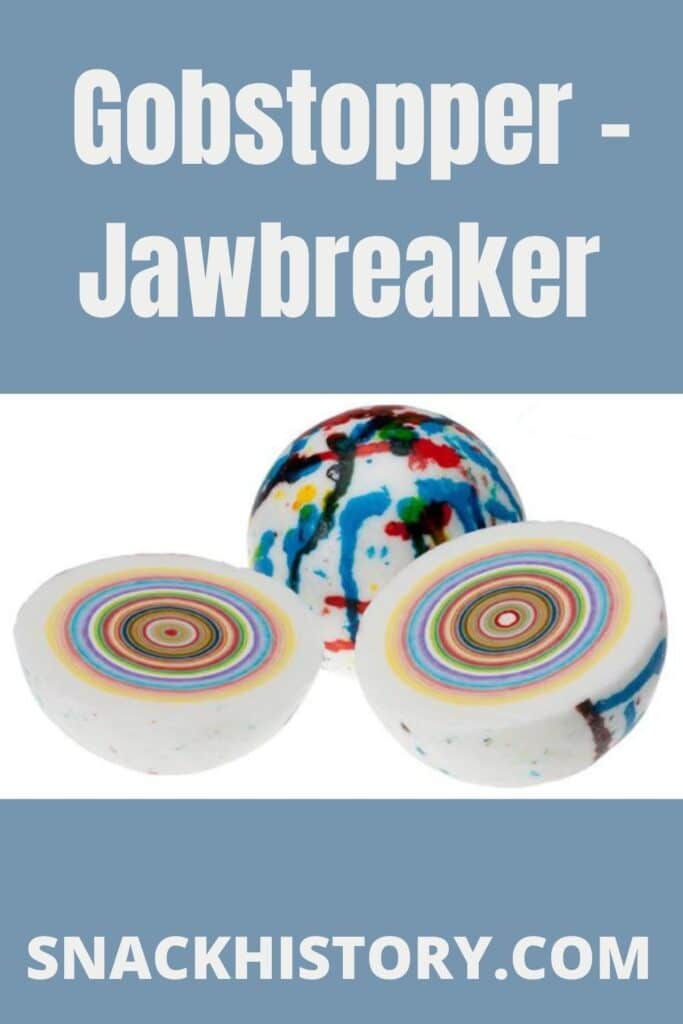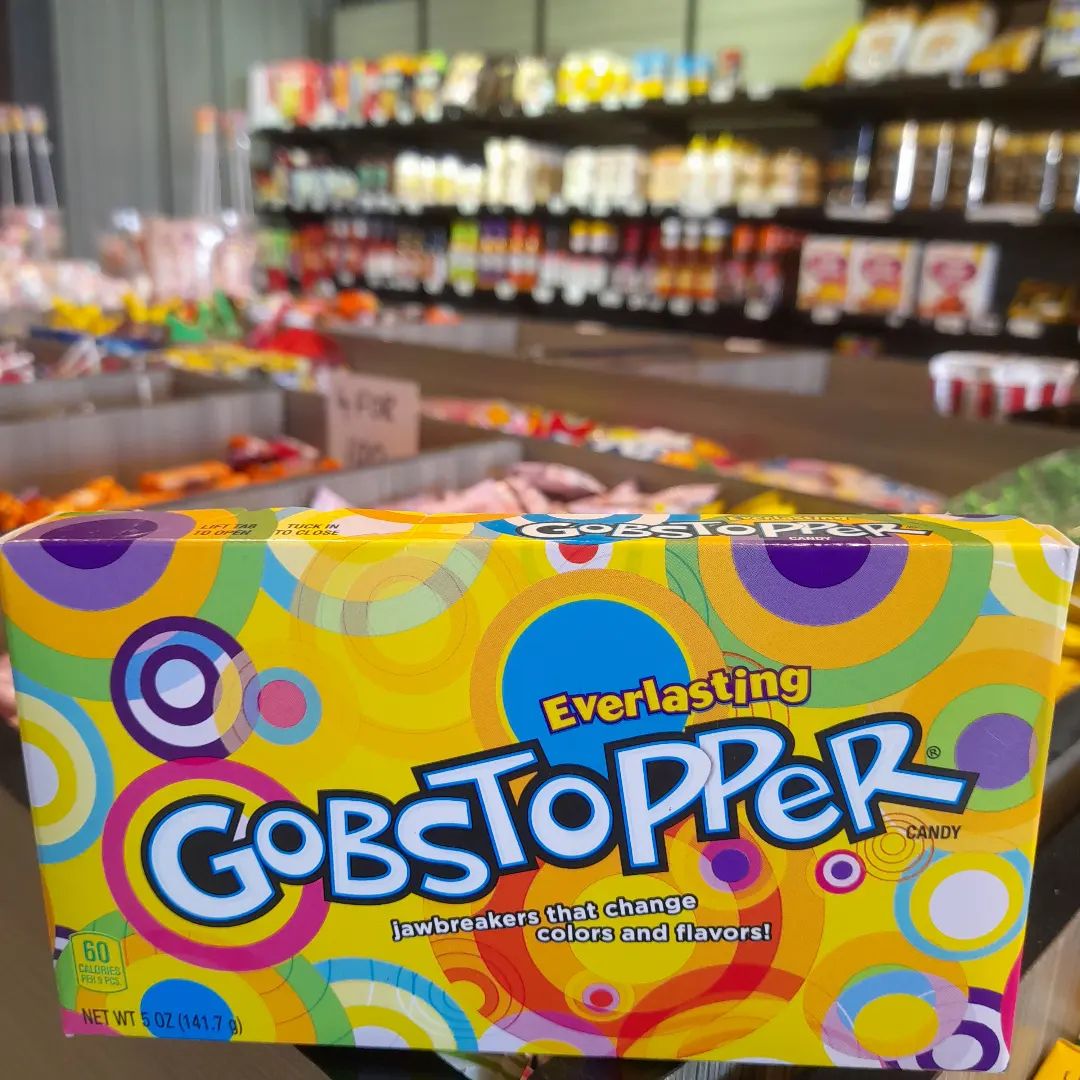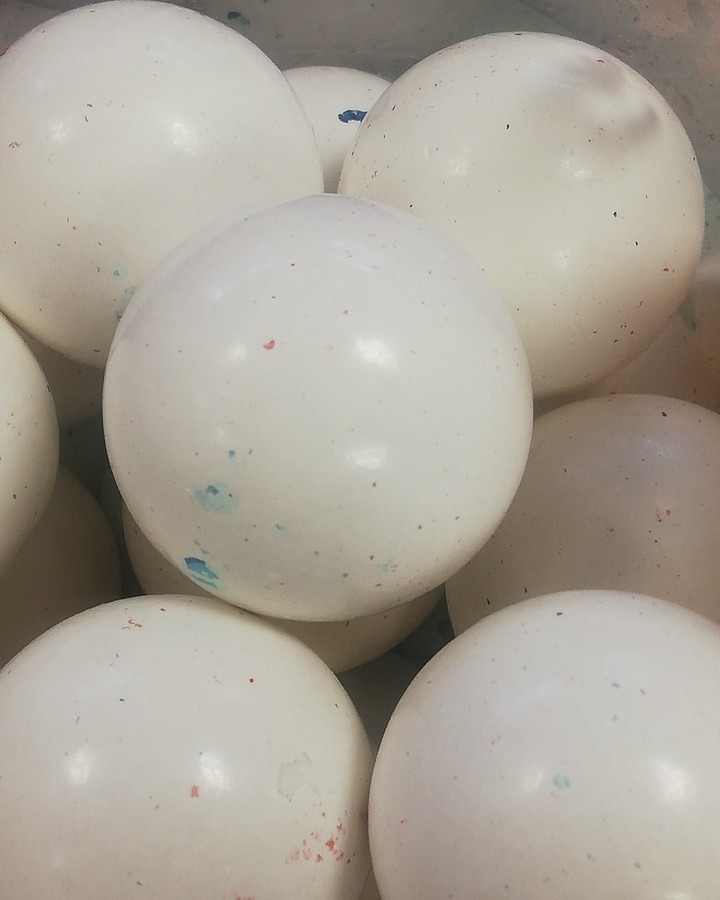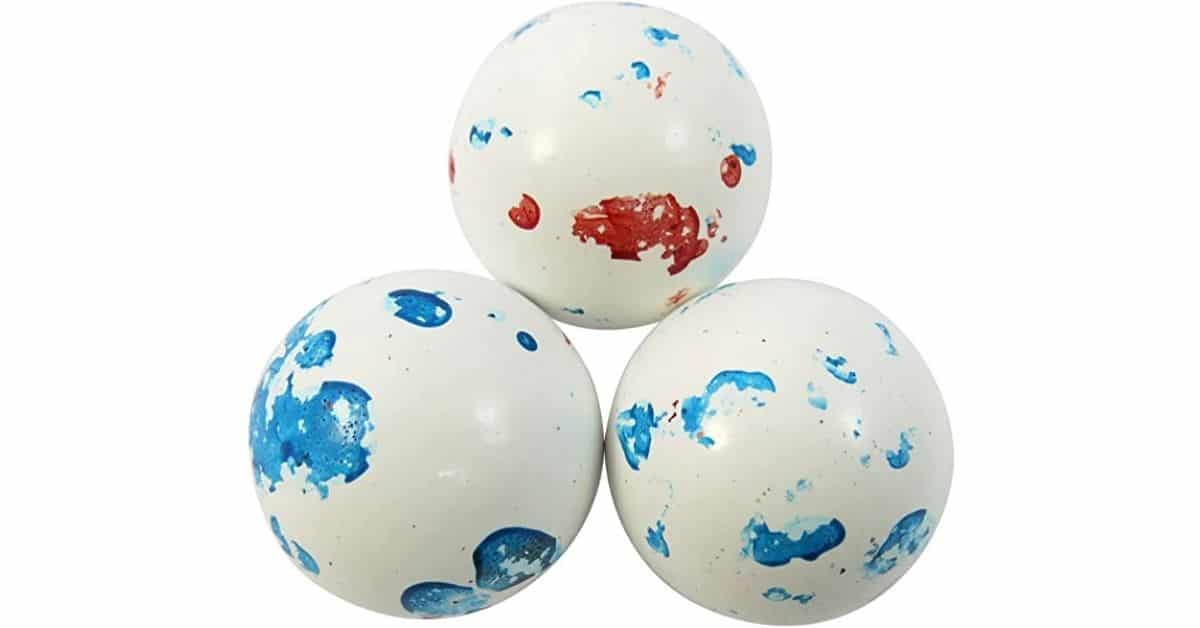Gobstopper – Jawbreaker (History, Ingredients & Pictures)
Gobstoppers are also known as Jawbreakers. The term Gobstopper is actually British, while Americans are more likely to call this candy a Jawbreaker. Either way, it is the same candy that is being referred to, and this is a candy that is intended to be sucked on since it is so hard. These candies come in various sizes, and they might also be flavored in various different ways.
Some makers of this product sell the candies in varying sizes in the same bag, or you can often buy them bulk in the same size from bins at larger candy stores. Gobstoppers might be sold in giant form as well to make them more challenging to eat as well as more novel and fun to give as gifts.
Please leave a review or any memories of this snack in the comments at the bottom of this page. Thank you!

History
Gobstoppers are named this way because the slang word for mouth in Britain is “gob”. This means that this candy was sold with the idea that it would stop your “gob” from making noise while you were eating it. The size of the candy can have an impact on how true this is, but the original product was marketed with this silly name regardless of the size of the Gobstopper itself.
The origins of this unique candy are thought to date back to ancient Egypt. Candies were created at this time by using fruit or nuts with seasonings and coating them in layers of different spices. Sugar was not used as a treat at this time due to the cost, so layered snacks were not hard like the current version of this candy, but the formation of the products was still largely the same. When machinery was invented that allowed for the dipping of candies to make layers of hardened sugar, the Gobstopper and other hard candies became possible.
The first Gobstopper was made by the Ferrara Pan Candy Company of Forest Park, Illinois. This was a candy that would immediately be recognizable as a Gobstopper or Jawbreaker to those who enjoy the candies today. There has not been much change to the way that this candy has been made for many generations, and the first candy would be instantly familiar even to modern candy lovers.
Schoolboys loved these little treats, and they were quite commonly sold to children going home from school in the first half of the 20th century. These are candies that have almost always been made out of many layers of candy that are added through a dipping process. Each layer is allowed to cool and harden, and then another is added. This hardness is part of why the American version of the candy is known as a Jawbreaker rather than a Gobstopper.
These candies will always have to be sucked on because they are much too hard to break up with the teeth. When people buy the extra-large or giant Gobstoppers that are sold today, it can be quite the chore to eat the candy until it has been dissolved down to a more reasonable size. Gobstoppers are still sold by weight in many places, and you will get more candies for your money if you pick the smaller and much more edible candies that are on the market.
The traditional candy was made with an aniseed at the core of the Gobstopper. This was the hard center that was used to add all the other layers onto the Gobstopper. The layers might be colorful or offer different flavors as well. This process took a couple of weeks to complete so that each layer of liquid sugar could harden properly in between dipping processes.
Companies like Nestle have made lots of versions of this candy over the years. They were the first to make a product that was meant to mimic the Everlasting Gobstopper mentioned in Willy Wonka And The Chocolate Factory, and they sold their Gobstopper product under this name. In the book, the candies were supposed to last forever, but of course, the real item could not offer this promise. This was still one of the most popular Gobstoppers sold during the 70s, owing to the flavor and the connection with the popular books and movies.
There are various other TV shows and movies that have referenced Jawbreakers or Gobstoppers as part of the culture of action of the show. Ed, Edd N Eddy mentioned Gobstoppers that are huge and that are the main subject of many episodes of the show. This was added to the video game for the show as well.
Happy Tree Friends includes a character named Nutty who tries to chew up a Gobstopper and breaks his jaw doing so. There is also a comedy called Jawbreaker from 1999 that was made in America and which features a teen girl dying after gagging on a Jawbreaker.
There have also been some cases where parents sued companies after accidents related to their children consuming Gobstoppers. In one case, a girl was said to suffer severe burns when a Wonka Everlasting Gobstopper exploded in her face after being frozen more than one time. This was apparently not the only accident of this nature that happened in the early 2000s, right before the Wonka line of candies was discontinued by Nestle.
In most cases, the injuries that you might sustain when eating Gobstoppers can be avoided by simply sucking on them and not biting them. This is not a candy that is meant to be enjoyed in a few moments, and the larger candies might require some patience to enjoy. This is the charm of the Gobstopper, after all, and trying to chew up a candy that might break your teeth is not necessary if you want to truly have fun eating this unique candy.
Ingredients
No matter what kind of Gobstopper or Jawbreaker you buy, most of the ingredients will just be sugar-based. When looking at the Everlasting Gobstopper recipe, the ingredients are:
- Dextrose
- Maltodextrin
- Less than 2% of corn syrup, malic acid, calcium stearate, Carnauba Wax
- Natural flavors
- Colors Blue 1, Blue 2 Lake, Red 40 Lake, Yellow 5, Yellow 5 Lake, Yellow 6
Some brands that make this product might add other flavorings, which could impact the overall ingredients. No matter what Gobstopper you pick, however, the ingredients will mostly be sugar-based since the candies are made simply by dipping them into liquid sugar over and over and over.
Nutrition
| Serving Size: | 9 pieces (15g) | % Daily Value* |
| Amount Per Serving | ||
| Calories from Fat | 0 | |
| Calories | 60 | |
| Total Fat | 0g | 0% |
| Sodium | 0mg | 0% |
| Total Carbohydrates | 14g | 5% |
| Sugars | 13g | |
| Protein | 0g |
- Percent Daily Values are based on a 2000 calorie diet.
How Are Gobstoppers Packaged?
Most Gobstopper products are sold in bulk. This means that you will be able to head to your local candy store and simply scoop up as many of these candies as you wish and put them into a bag. They are then paid for by weight, and you will have the treat to enjoy whenever you wish. When these candies are sold individually, they are typically wrapped in clear plastic wrappers, or they might be sold in plastic tubes.
Smaller Gobstopper candies are sometimes also sold in little baggies that can be resealed. There is a wide array of this kind of candy on the market and made by different companies, so packaging might vary somewhat. You will likely see some consistency in the fact that the candies are almost always individually wrapped when not sold in bulk, but other than that, everything from plastic bags to cardboard boxes might be employed to package these candies. The Nestle version was sold in cardboard boxes, but they are one of the few candy companies to still package candies in this way. Most modern candy companies have moved away from this model and have started using more cost-effective and efficient plastic bags.
In some locations, you might still also be able to get a Gobstopper from a coin machine. These used to be really common outside grocery stores and other locations in public areas, but this has become mostly a thing of the past. For those who love to have a really authentic candy experience, dropping a quarter into a machine and getting candy can be a really fun thing to do.
Some Related Candies That Are Also Gobstoppers
There are various candies that might fall under the heading of Gobstopper besides the Everlasting Gobstopper made by Nestle. Atomic Fireballs fall under this heading and so do Lemonheads. Some classic candies that are similar are the Aniseed Ball and the Humbug. All of these candies are made with the same dipping process that creates the Gobstopper.
If you love a simple candy that is full of layered sugar goodness, this is the right kind of hard candy for you to try. You will find many different kinds of Gobstoppers sold today that you can enjoy, and some of them might be sour or spicy. There are many options out there for those who love a good hard candy, and the various brands that make them seem to come up with new flavors and options every year.
Pictures


Videos
The Everlasting Gobstopper mentioned in the Willy Wonka movie:
A taste test of the Everlasting Gobstopper:
How Jawbreakers are made:
The largest Jawbreaker candies compared:

My name is Brianna and I love writing on all topics. Candy history fascinates me and I am passionate about sharing my love of this topic with everyone else!
Please leave a review or any memories of this snack in the comments below. Thank you!
Click here for a full A-Z list of Snacks and Candy
